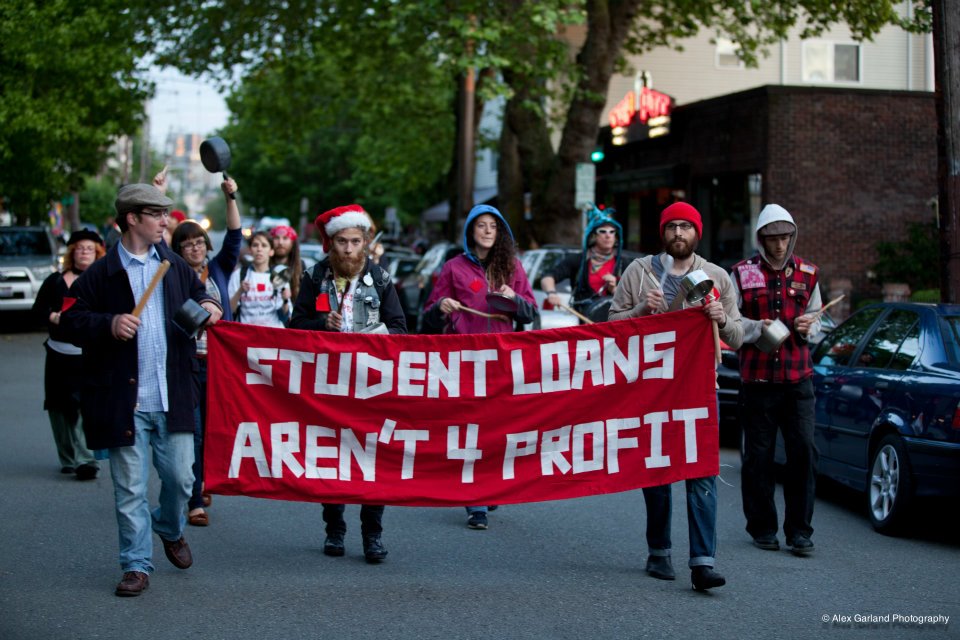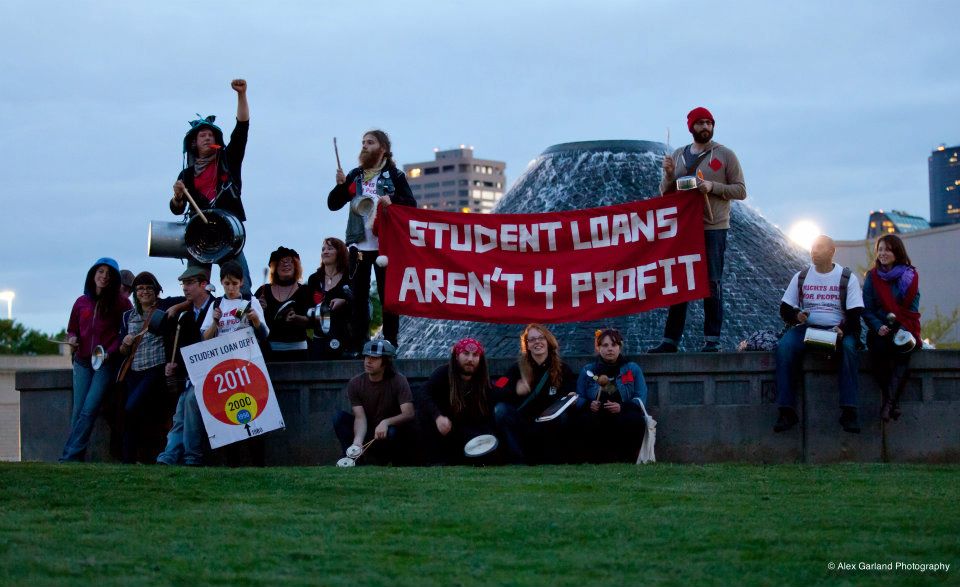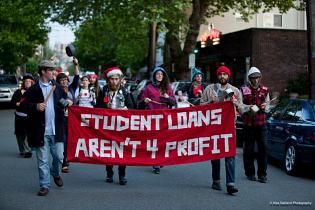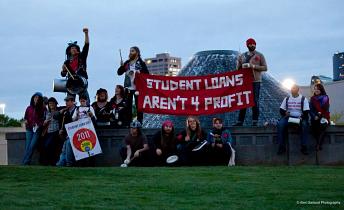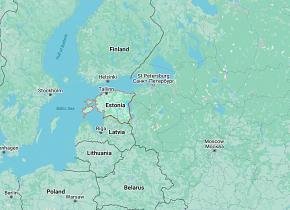Students organize Free Education Campaign
Canadians are familiar with the plight of students who face increased tuition and debilitating debts, as well as many other serious challenges. The student strike in Montreal lasted for many months and the public became accustomed to seeing red banners and thousands of marchers banging on pots and pans as they filled the streets. The right to free education has been eliminated in most countries around the world as governments and bankers practice their harsh economic austerity measures.
The United States is now facing a shocking one trillion dollars in student loan debt, and by some estimates at least 50% of college graduates are currently unable to find work with the degrees they have earned. This educational and economic crisis was one reason behind the demonstrations and rallies held on over 20 college and university campuses on April 5, 2012 - "1 T Day".
Public schools across the nation have been struggling to survive under the current regime of American "austerity measures". Cutting funding for education has been a way for the states to eliminate some of their huge budget deficits. Students are trying to fund their education and find jobs during a period of high unemployment and low expectations. The conservative economic policies of Wall Street and Washington, DC have led to a poor economy. In some cases, Masters level graduates have been forced to accept minimum wage jobs in the service industry as way to pay off their student loans.
We are witnessing a deterioration of the traditional mechanisms through which we have allowed working class kids to acquire wealth and power through the pursuit of a higher education. The acquisition of a college degree used to be a major part of the sentimental American Dream. Now this dream is beyond the grasp of the poor and most members of the middle class.
In past decades, people could find jobs at the factory and work long hours in order to save up enough money to finance their children's education. The goal was to allow their kids to grow up to experience a better life than they had back during WW II or the Depression era. But today many former students are living at home with mom and dad trying to find a way to pay off their debts. The usual methods used to escape the working class have been eroded to the point of nonexistence. There are no more grand promises from the company about good wages, healthcare benefits, and early retirement - that dream is gone for most folks in the US. They have been outsourced and downsized by corporate raiders like Mitt Romney. The governments own statistics show that approximately 50% of the American people find themselves in or near poverty. It's the "one paycheck away" syndrome. Under these difficult circumstances, it is understandable why some student activists are calling for debt amnesty.
The two major party candidates for president made a political issue out of the trillion dollars in student debt. President Obama has called on Congress to extend the low interest rates on student loans. But out on the streets and back at home families are suffering because their savings are gone due to the skyrocketing costs of education and healthcare. Hollow campaign promises from political candidates will not change the economic picture for most students. In their young eyes, the dream that their parents worked so hard to achieve has come to nothing for the current generation. They watch on the sidelines as the wealthy elite of the nation enjoy their high social and political status. But burdened by enormous debts and lacking potential employment, many of the students see no hopeful economic future for themselves.
Given the present desperate plight of most college bound students in the US, it should come as no surprise to anyone that students, teachers, and Occupy Wall Street movement activists have been forming coalitions. They often march together on unifying issues like free speech on campus or funding for education. A natural affinity exists between these groups and it has coalesced into a local movement for education reform. Their solidarity with the student strike in Montreal has been expressed many times during dozens of demonstrations in the Northwest and across the US.
In Seattle, a group of students, educators and occupy activists have created a project designed to bring free education to the community. They plan to offer courses taught by volunteers - teachers, scientists, carpenters, etc. The campaign is this group's response to one trillion dollars in student debt. The project was inaugurated on "1 T Day" at Westlake Park. The consistent theme of the group's campaign has been: "Free Education for Everyone".
One example of existing free education in the US is Coursera, an online project co-founded by Stanford University computer science professor Daphne Koller. Free online courses are being taught by professors from Princeton, The University of Pennsylvania, The University of Michigan, and Stanford.
Through their discussion meetings and by utilizing social networking tools, the activists in Seattle may actually be laying the foundations for a truly revolutionary way to organize public education. They are already recruiting volunteers from the local community to provide instruction on a wide variety subjects not usually taught in most mainstream colleges and universities.
Instead of huge corporate funded research institutes, the organizers envision local craft persons, artists, teachers and professionals offering to share their skills and knowledge with the public on a volunteer or non-profit basis.
"1 T Day" education reformers in Seattle believe that the only way they'll be able to honor the original vision of community education is by conducting courses outside of the official public and private school system. If successful, these efforts in Seattle could herald a new era of educational reforms which are actually centered on the community, rather than in the administrative board rooms.
In the face of increasing debt and decreasing job opportunities, this approach to public education might be a good first step towards eliminating the economic burden on most students in the US. The Seattle group is planning to create a mobile "Free University", complete with its own library of alternative literature and information. There's no reason why this can't be done in communities all across the country. All it takes are volunteers and a dedicated group of activists to make it happen.
Access to education should be one of the New Bill of Rights for all Americans. When we can no longer provide affordable educational opportunities to the majority of people, then it is perhaps time to explore new less institutional models. The idea of establishing free universities is not new, but it may be an idea whose time has finally come. Given the current increases in tuition and the quick accumulation of debt, there may be no other option for many students who want to educate themselves.
A cynical person might ask themselves the following question:
If you're going to finance your way to a post graduate degree only to find yourself working off your debts as a barista at the local cafe, why not just get a free education and skip with all that expense? You could still have the job at the coffee shop, and you could still become an educated person, but there would be no debt to pay off, and you wouldn't have wasted all of your time and money working towards a degree that is worthless!
A free education for everyone might be possible if we demand it from our political representatives. But in the meantime, I support volunteer efforts to provide free access to knowledge and training for local communities.
Comments
There are 0 comments on this post


